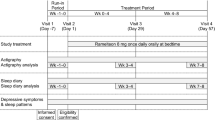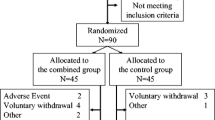Abstract
Escitalopram has been shown to be effective for treating major depression (MDD); however, research is lacking regarding its effect on treating MDD-related sleep impairments. The purpose of this study was to assess the efficacy of escitalopram monotherapy and investigate changes in insomnia, depressive symptoms, and quality of life (QOL). Participants were 14 patients with MDD who enrolled in a clinical trial at Jikei University Katsushika Medical Center. Escitalopram monotherapy was used, and hypnotics were administered three times per week for individuals suffering from sleep impairments. The following variables were assessed: (1) sleep quality [Pittsburgh sleep quality index (PSQI)], (2) depression [Zung self-rating depression scale (ZSRDS)], and (3) quality of life (QOL) as determined by the Sheehan disability scale (SDISS) and short form (36) health survey (SF-36). These assessments were conducted prior to any treatment (pre-test) and again 8–12 weeks after treatment (post-test). Monotherapy (E = escitalopram alone; n = 6) and combination therapy (E+ = escitalopram + zolpidem; n = 8) groups were compared. All participants completed the full protocol (average 9.4 ± 1.8 weeks). Regardless of treatment group, participants improved on all assessments (including sleep impairment). However, groups did not differ in their level of improvement. A two-factor ANOVA revealed that the E+ group showed particular improvements in QOL. In treating MDD and associated sleep impairments, zolpidem did not confer additional benefits. Thus, clinicians should consider E monotherapy for patients with MDD-related sleep impairments before prescribing combination therapies.
Similar content being viewed by others
References
Kirino E. Escitalopram for the management of major depressive disorder: a review of its efficacy, safety, and patient acceptability. Patient Prefer Adherence. 2012;6:853–61.
Leopa UM. Escitalopram (10–20 mg/day) is effective and well tolerated in a placebo-controlled study in depression in primary care. Int Clin Psychopharmacol. 2003;18:11–7.
Colonna L, Andersen HF, Reins EH. A randomized, double-blind, 24-week study of escitalopram (10 mg/day) versus citalopram (20 mg/day) in primary care patients with major depressive disorder. Curr Med Res Opin. 2005;21:1659–68.
Langtry HD, Benfield P. Zolpidem. A review of its pharmacodynamic and pharmacokinetic properties and therapeutic potential. Drugs. 1990;40:291–313.
Tsuno N, Besset A, Ritchie K. Sleep and depression. J Clin Psychiatry. 2005;66:1254–69.
Coleman RM, Roffwarg HP, Kennedy SJ, Guilleminault C, Cinque J, Cohn MA, Karacan I, Kupfer DJ, Lemmi H, Miles LE, Orr WC, Phillips ER, Roth T, Sassin JF, Schmidt HS, Weitzman ED, Dement WC. Sleep-wake disorders based on a polysomnographic diagnosis. A national cooperative study. JAMA. 1982;247:997–1003.
Baglioni C, Battagliese G, Feige B, Spiegelhalder K, Nissen C, Voderholzer U, Lombardo C, Riemann D. Insomnia as a predictor of depression: a meta-analytic evaluation of longitudinal epidemiological studies. J Affect Disord. 2011;135:10–9.
Fava GA, Grandi S, Zielezny M, Canestrari R, Morphy MA. Cognitive behavioral treatment of residual symptoms in primary major depressive disorder. Am J Psychiatry. 1994;151:1295–9.
Iwaki S, Satoh K, Matsumoto Y, Echizenya M, Katoh T, Kusanagi H, Kitamura S, Shimizu T, Mishima K. Treatment-resistant residual insomnia in patients with recurrent major depressive episodes. Sleep Biol Rhythm. 2012;10:202–11.
McClintock SM, Husain MM, Wisniewski SR, Nierenberg AA, Stewart JW, Trivedi MH, Cook I, Morris D, Warden D, Rush SJ. Residual symptoms in depressed outpatients who respond by 50 % but do not remit to antidepressant medication. J Clin Psychopharmacol. 2011;31:180–6.
Nierenberg AA, Keefe BR, Leslie VC, Alpert JE, Pava JA, Worthington JJ 3rd, Rosenbaum JF, Fava M. Residual symptoms in depressed patients who respond acutely to fluoxetine. J Clin Psychiatry. 1999;60:221–5.
The Japanese Society of Sleep Research. The clinical guidelines of the appropriate usage and discontinuation on hypnotics. 2013. http://www.jssr.jp/data/pdf/suiminyaku-guideline.pdf. Accessed 1 Jan 2016.
Fava M, McCall WV, Krystal A, Wessel T, Rubens R, Caron J, Amato D, Roth T. Eszopiclone co-administered with fluoxetine in patients with insomnia coexisting with major depressive disorder. Biol Psychiatry. 2006;59:1052–60.
Fava M, Schaefer K, Huang H, Wilson A, Iosifescu DV, Mischoulon D, Wessel TC. A post hoc analysis of the effect of nightly administration of eszopiclone and a selective serotonin reuptake inhibitor in patients with insomnia and anxious depression. J Clin Psychiatry. 2011;72:473–9.
Fava M, Asnis GM, Shrivastava RK, Lydiard B, Bastani B, Sheehan DV, Roth T. Improved insomnia symptoms and sleep-related next-day functioning in patients with comorbid major depressive disorder and insomnia following concomitant zolpidem extended-release 12.5 mg and escitalopram treatment: a randomized controlled trial. J Clin Psychiatry. 2011;72:914–28.
McCall WV, Blocker JN, D’Agostino R Jr, Kimball J, Boggs N, Lasater B, Haskett R, Krystal A, McDonald WM, Rosenquist PB. Treatment of insomnia in depressed insomniacs: effects on health-related quality of life, objective and self-reported sleep, and depression. J Clin Sleep Med. 2010;6:322–9.
Hsu HM, Chou KR, Lin KC, Chen KY, Su SF, Chung MH. Effects of cognitive behavioral therapy in patients with depressive disorder and comorbid insomnia: a propensity score-matched outcome study. Behav Res Ther. 2015;73:143–50.
Buysse DJ, Reynolds CF 3rd, Monk TH, Berman SR, Kupfer DJ. The Pittsburgh sleep quality index: a new instrument for psychiatric practice and research. Psychiatry Res. 1989;28:193–213.
Zung WW. A self-rating depression scale. Arch Gen Psychiatry. 1965;12:63–70.
Hays RD, Sherbourne CD, Mazel RM. The RAND 36-item health survey 1.0. Health Econ. 1993;2:217–27.
Sheehan KH, Sheehan DV. Assessing treatment effects in clinical trials with the discan metric of the Sheehan disability scale. Int Clin Psychopharmacol. 2008;23:70–83.
Wilson S, Argyropoulos S. Antidepressants and sleep: a qualitative review of the literature. Drugs. 2005;65:927–47.
Quera-Salva MA, Hajak G, Philip P, Montplaisir J, Keufer-Le Gall S, Laredo J, Guilleminault C. Comparison of agomelatine and escitalopram on nighttime sleep and daytime condition and efficacy in major depressive disorder patients. Int Clin Psychopharmacol. 2011;26:252–62.
Todder D, Baune BT. Quality of sleep in escitalopram-treated female patients with panic disorder. Hum Psychopharmacol. 2010;25:167–73.
Holshoe JM. Antidepressants and sleep: a review. Perspect Psychiatr Care. 2009;45:191–7.
Winokur A, Gary KA, Rodner S, Rae-Red C, Fernando AT, Szuba MP. Depression, sleep physiology, and antidepressant drugs. Depress Anxiety. 2001;14:19–28.
Beasley CM Jr, Koke SC, Nilsson ME, Gonzales JS. Adverse events and treatment discontinuations in clinical trials of fluoxetine in major depressive disorder: an updated meta-analysis. Clin Ther. 2000;22:1319–30.
Gursky JT, Krahn LE. The effects of antidepressants on sleep: a review. Harv Rev Psychiatry. 2000;8:298–306.
Winokur A, DeMartinis NA 3rd, McNally DP, Gary EM, Cormier JL, Gary KA. Comparative effects of mirtazapine and fluoxetine on sleep physiology measures in patients with major depression and insomnia. J Clin Psychiatry. 2003;64:1224–9.
Wade AG. Sleep problems in depression: how do they impact treatment and recovery? Int J Psychiatry Clin Pract. 2006;10(Suppl 1):38–44.
Mitchell HA, Weinshenker D. Good night and good luck: norepinephrine in sleep pharmacology. Biochem Pharmacol. 2010;79:801–9.
Thaler KJ, Morgan LC, Van Noord M, Gaynes BN, Hansen RA, Lux LJ, Krebs EE, Lohr KN, Gartlehner G. Comparative effectiveness of second-generation antidepressants for accompanying anxiety, insomnia, and pain in depressed patients: a systematic review. Depress Anxiety. 2012;29:495–505.
Dan JS, Ana GL. Effects of escitalopram on sleep problems in patients with major depression or generalized anxiety disorder. Adv Ther. 2011;28:1021–37.
Lader M, Andersen HF, Baekdal T. The effect of escitalopram on sleep problems in depressed patients. Hum Psychopharmacol. 2005;20:349–54.
Stein DJ, Lopez AG. Effects of escitalopram on sleep problems in patients with major depression or generalized anxiety disorder. Adv Ther. 2011;28:1021–37.
Acknowledgments
No individuals employed or contracted by the funders (other than the named authors) played any role in the study design, data collection and analysis, decision to publish, or preparation of the manuscript. No funding to report for this study.
Author information
Authors and Affiliations
Corresponding author
Ethics declarations
Conflict of interest
None declared.
Rights and permissions
About this article
Cite this article
Yamadera, W., Morita, M., Sakamoto, S. et al. Comparison of escitalopram alone and combined with zolpidem in treating major depression and related sleep impairments. Sleep Biol. Rhythms 14, 303–308 (2016). https://doi.org/10.1007/s41105-016-0059-5
Received:
Accepted:
Published:
Issue Date:
DOI: https://doi.org/10.1007/s41105-016-0059-5




